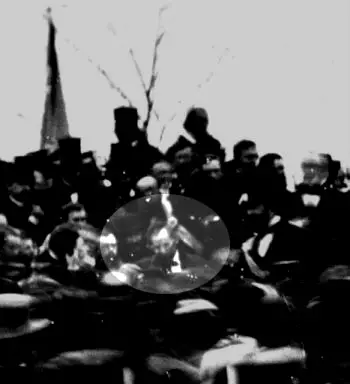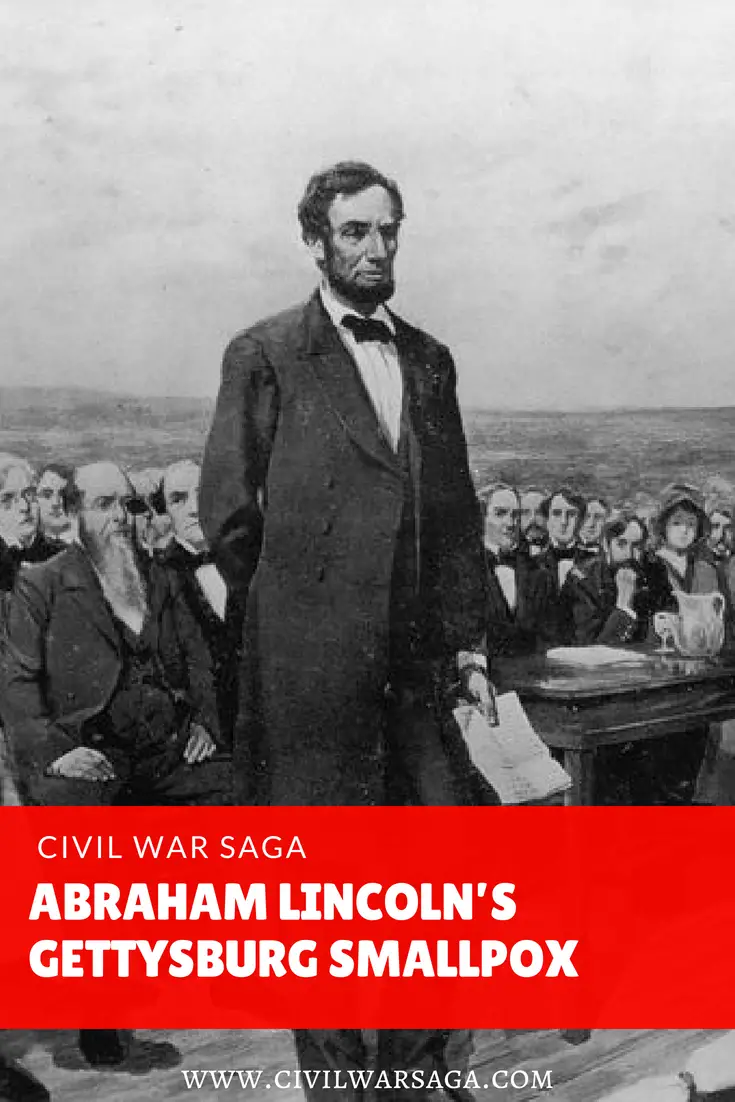When Abraham Lincoln delivered the historic Gettysburg Address in November of 1863, little did the public know he was ill with a deadly form of smallpox.
Lincoln’s symptoms first began during his train ride to Gettysburg on November 18, when Lincoln reportedly told his private secretary, John Hay, that he felt dizzy and weak. Looking pale and still feeling sick, Lincoln pressed on and successfully delivered his famous speech without a hitch.
On the train ride home, his symptoms worsened and he began to complain of a severe headache. Back at the White House, Lincoln soon developed back pains, high fever and a widespread rash that eventually morphed into itchy lesions.
According to the autobiography of surgeon J.M.T. Finney, after losing a large amount of weight and feeling unwell for weeks, a doctor finally diagnosed his illness as a mild form of smallpox that later came to be known as Variola minor.

Illustration of Abraham Lincoln giving the Gettysburg Address
Yet, a 2007 study published in the Journal of Medical Biography suggests that Lincoln could not have had Variola minor, and instead had the life-threatening form of smallpox known as Variola major.
According to the study, Variola minor didn’t even appear in the U.S. until the end of the 19th century and was unknown in the U.S. at the time of Lincoln’s diagnosis. The study suggests that Lincoln’s doctor may have tried to downplay the serious of his illness to prevent panic among the public.

Only known photo of Abraham Lincoln at Gettysburg
It is unknown how Lincoln may have contracted smallpox, but his son Tad was sick the week before with an unknown illness that caused a fever and a rash. Despite the fact that smallpox vaccines were commonly used to prevent contracting the disease, there is no evidence that Lincoln was ever vaccinated against it.
According to the memoirs of William Stoddard, Lincoln’s secretary, Lincoln’s doctor personally vaccinated the White House staff to protect them from contracting it:
“Somewhere about these days, without date, the smallpox was raging with some severity, taking generally the shape of varioloid, and it brought me an odd experience. One morning the face of my family physician came into my house a little clouded, to inform me that it was his duty to revaccinate every soul of us, whether we had ever been poisoned in that way before or not. I had been and thought it a useless precaution but he insisted and to my surprise my arm swelled dreadfully and I felt sure that I was thereby made entirely secure. Blackly so. My scab had peeled and my safety had come before the president himself was taken down with the varioloid. Some of his enemies averred that it was the larger kind of smallpox and that his fatal case was only concealed from the public for war purposes. All the other members of the White House family were visited by the president’s own doctor and I was compelled to show my arm. I am not sure that it was not punched again. I am inclined to think it was, in his zeal for the public good. I do remember that we boys held mournful consolations over the idea that all the country would go to ruin if Abraham Lincoln should die of the dread disease, or any other.”
Fortunately, both Lincoln and his son survived. After feeling ill for three weeks, Lincoln eventually made a full recovery and resumed his presidential duties.
While Lincoln had been recovering, his servant, William Johnson, also came down with the disease and didn’t fare as well. By mid-January, Johnson was dead. Lincoln paid for his funeral himself and buried him at Arlington Cemetery.
Although Johnson had attended to Lincoln when he first became ill, he didn’t think he had caught the smallpox from him, telling a reporter at the time: “He did not catch it from me, however; at least I think not,”
Washington D.C. was in the middle of a smallpox outbreak at the time so it is likely that both Johnson and Lincoln could have caught it anywhere.
Although Lincoln recovered, the process of fully regaining his strength continued for a while and he was ill, off and on, for a few months after the illness.
Sources:
Lincoln’s White House Secretary: The Adventurous Life of William O. Stoddard; William Osborn Stoddard
The Gettysburg Gospel: The Lincoln Speech That Nobody Knows by Gabor Boritt
A Surgeon’s Life: The Autobiography of J. M. T. Finney; J. M. T. Finney
MSNBC: Did Abe Lincoln Have Smallpox?: http://www.msnbc.msn.com/id/18727435/ns/technology_and_science-science/t/did-abe-lincoln-have-smallpox/#.TyRokYFSySo
Abraham Lincoln’s Gettysburg Illness: http://www.ncbi.nlm.nih.gov/pubmed/17551612

